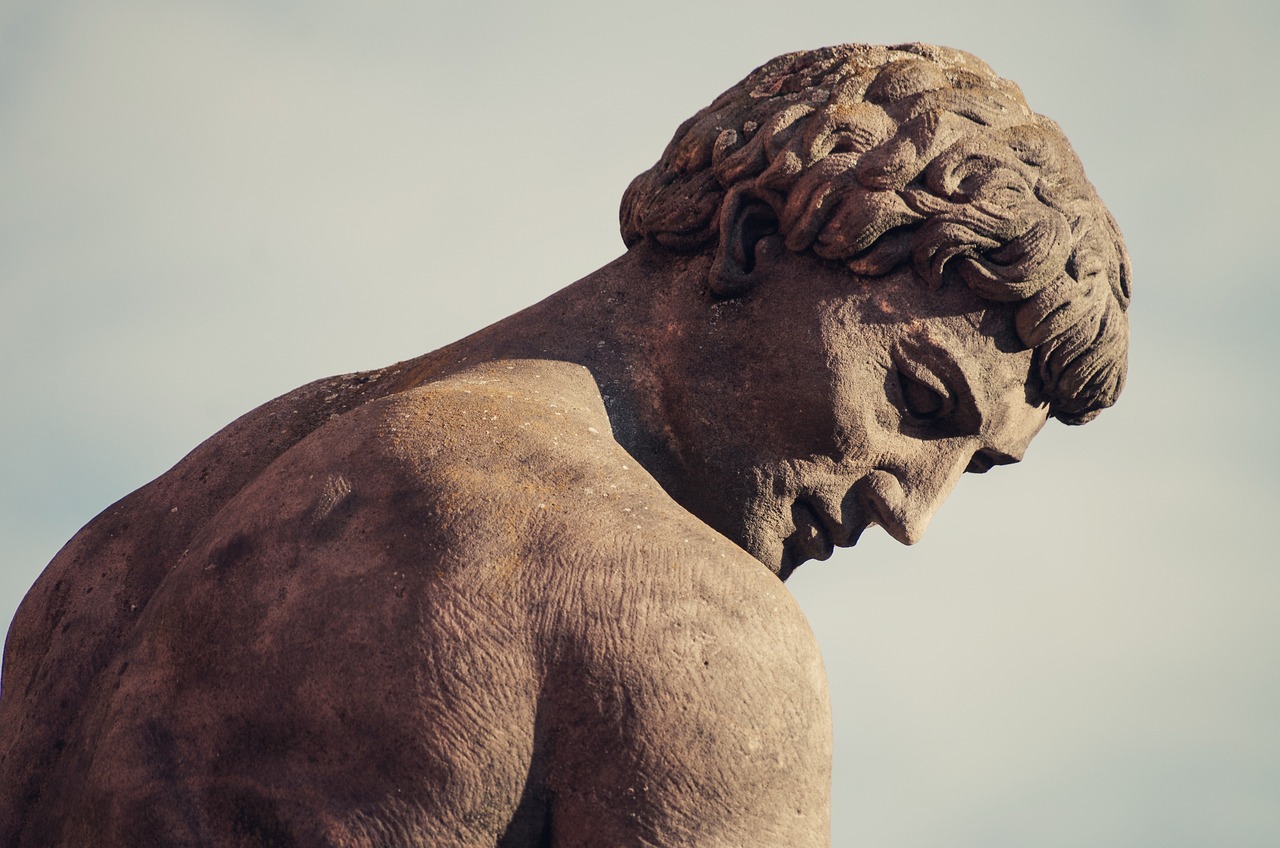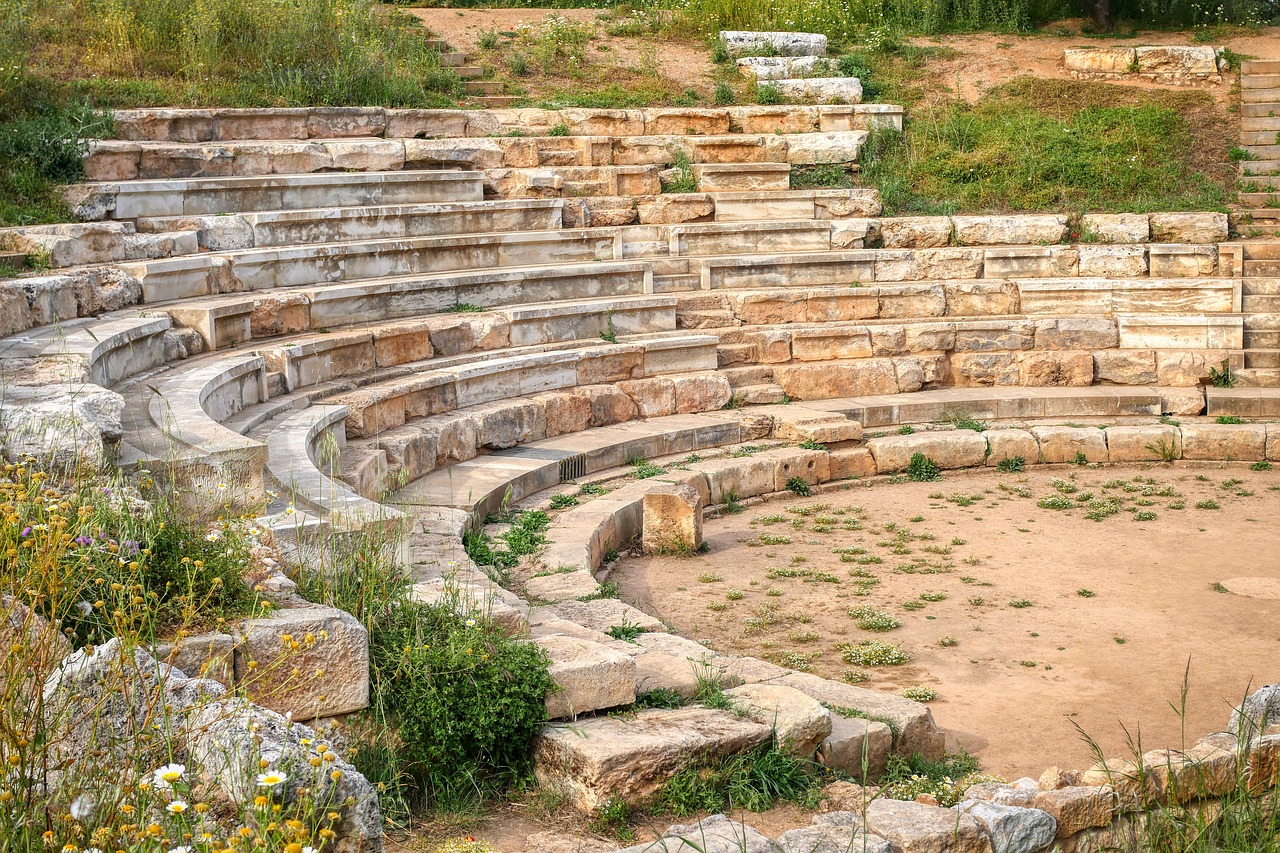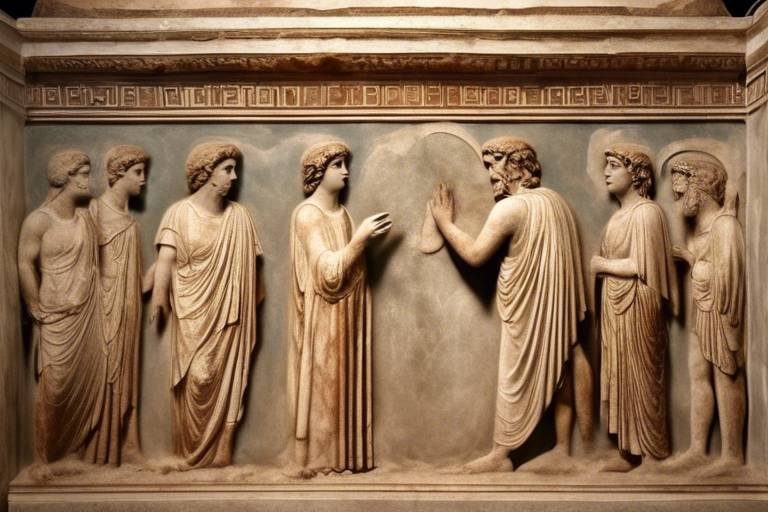The Secrets of the Ancient Greek Oratory
Have you ever wondered how the power of words could ignite minds, sway opinions, and shape the course of history? In ancient Greece, the art of oratory held the key to unlocking the hearts and minds of the masses, with skilled speakers wielding words like weapons on the battlefield of ideas. Let's delve into the enigmatic world of ancient Greek oratory, where eloquence was revered, and persuasion was an art form.
Imagine standing in the grand amphitheaters of Athens, surrounded by eager listeners hanging onto your every word. This was the stage where legendary orators like Demosthenes, Pericles, and Gorgias honed their craft, mastering the subtle art of rhetoric that would echo through the annals of time. Their speeches were not mere words but powerful tools that could spark revolutions, forge alliances, and topple empires.
At the heart of ancient Greek oratory lay a deep understanding of human nature and the power of persuasion. Orators skillfully employed rhetorical devices such as ethos, pathos, and logos to appeal to the emotions, ethics, and logic of their audiences. Through captivating storytelling, emotional appeals, and logical arguments, they could sway even the most hardened hearts and minds.
But oratory was not just a tool for public speaking; it was a cornerstone of democracy and governance in ancient Greece. In the bustling city-states, political debates were not won by force but by the power of words. Orators played a pivotal role in shaping public opinion, influencing decision-making processes, and upholding the principles of justice and democracy.
Education in oratory was highly valued in ancient Greece, with institutions like the Academy of Plato and the Lyceum of Aristotle providing rigorous training in rhetoric and public speaking. Students were taught not just to speak eloquently but to think critically, argue persuasively, and defend their ideas with conviction. Oratory was not just a skill but a way of life, shaping the minds of future leaders and thinkers.
Legal proceedings were another arena where the art of oratory shone brightly. Skilled lawyers and orators could sway juries, defend clients, and influence judicial outcomes through the power of persuasive speech. The courtroom became a stage where words held the power to determine guilt or innocence, justice or injustice.
The legacy of ancient Greek oratory continues to resonate in our modern world, shaping the way we communicate, persuade, and lead. The principles and practices of the ancient orators still guide us in the art of public speaking, politics, and rhetoric. Their secrets are not lost to time but live on in the words we speak and the ideas we share.
Q: How did ancient Greek orators influence political decision-making?
A: Ancient Greek orators used persuasive techniques and emotional appeals to sway public opinion, shape debates, and influence governance in city-states.
Q: What role did education play in shaping orators in ancient Greece?
A: Institutions like the Academy of Plato and the Lyceum of Aristotle provided rigorous training in rhetoric, critical thinking, and public speaking, molding future leaders and thinkers.
Q: How does the legacy of ancient Greek oratory impact modern communication?
A: The principles of ethos, pathos, and logos, along with storytelling and persuasive techniques, continue to shape public speaking, politics, and rhetoric in our contemporary world.

Historical Context of Oratory
Exploring the techniques and practices of public speaking in ancient Greece, revealing the strategies used by renowned orators to persuade and influence audiences, shaping the art of rhetoric that continues to impact communication today.
Understanding the cultural significance of oratory in ancient Greece was like unraveling a tapestry woven with threads of power, persuasion, and passion. In a society where words held the weight of a thousand swords, oratory emerged as not just a tool but a cornerstone of democracy and governance. The echoes of orators' voices reverberated through the agora, shaping public opinion, influencing decisions, and setting the stage for the birth of modern communication.

Key Orators of Ancient Greece
In the realm of ancient Greek oratory, several key figures stand out for their exceptional skills in public speaking and their profound influence on society. Among these notable orators are Demosthenes, Pericles, and Gorgias, each contributing uniquely to the art of rhetoric and persuasion.
Demosthenes, known for his fiery speeches and unwavering commitment to defending Athenian democracy, captivated audiences with his passionate delivery and sharp wit. His speeches against Philip II of Macedon are legendary for their power to mobilize the Athenian citizens against external threats.
Pericles, often referred to as the "father of Athenian democracy," was a master orator who shaped the political landscape of ancient Greece with his eloquence and strategic vision. His famous Funeral Oration, delivered during the Peloponnesian War, remains a timeless example of persuasive speech that honored fallen soldiers and inspired patriotism.
Gorgias, a skilled sophist and philosopher, was renowned for his innovative use of language and argumentation. His rhetorical techniques focused on the art of persuasion through clever wordplay and the manipulation of emotions, challenging traditional beliefs and norms through the power of speech.
These key orators of ancient Greece not only excelled in the art of public speaking but also left a lasting legacy that continues to influence modern communication and rhetoric. Their speeches reflected the cultural and political values of their time, shaping the course of history and setting a high standard for persuasive discourse.

Rhetorical Devices and Strategies
The art of ancient Greek oratory was not merely about speaking words but about weaving a tapestry of persuasion through the intricate use of rhetorical devices and strategies. Orators of that time understood the power of words to sway opinions, evoke emotions, and shape beliefs. They skillfully employed ethos, pathos, and logos to craft compelling speeches that resonated with their audiences on a profound level.
One of the key rhetorical devices used by ancient Greek orators was ethos, which focused on establishing credibility and authority. By presenting themselves as trustworthy and knowledgeable individuals, orators could gain the trust and respect of their listeners. This was crucial in persuading the audience to accept their arguments and viewpoints.
Pathos, another essential element of ancient Greek oratory, appealed to the emotions of the audience. Orators masterfully employed vivid storytelling, powerful imagery, and poignant language to evoke feelings of empathy, compassion, and even outrage. By connecting with the audience on an emotional level, they could elicit strong reactions and garner support for their cause.
Logos, the logical appeal, was also a cornerstone of effective oratory in ancient Greece. Orators used logical reasoning, evidence, and rational arguments to convince their listeners of the validity of their claims. By presenting facts, statistics, and logical deductions, they could appeal to the audience's intellect and persuade them through sound reasoning.
Furthermore, ancient Greek orators utilized a variety of rhetorical strategies to enhance the impact of their speeches. They employed anaphora to create rhythmic patterns and emphasize key points, antithesis to highlight contrasts and create tension, and metaphors to make abstract concepts more tangible and relatable.
By mastering these rhetorical devices and strategies, ancient Greek orators were able to captivate, persuade, and inspire audiences, leaving a lasting legacy that continues to influence public speaking and communication to this day.

Oratory in Political Discourse
Oratory in ancient Greece played a pivotal role in shaping political discourse within the city-states. The power of persuasive speech was not only valued but essential in influencing public opinion, swaying decisions, and mobilizing citizens towards a common cause. Orators like Demosthenes and Pericles were revered for their ability to use rhetoric as a tool for governance, employing eloquence to rally support for policies, shape legislative agendas, and navigate the complex dynamics of Athenian democracy.
Political debates in the Agora were not merely exchanges of ideas but battlegrounds of words, where orators strategically crafted their arguments using a combination of ethos, pathos, and logos to appeal to the emotions, ethics, and logic of the audience. The art of oratory was not just about speaking well but about wielding language as a weapon, a means to assert authority, build alliances, and secure political influence.
Oratory was deeply intertwined with the democratic process, as public speeches were not only platforms for self-expression but mechanisms for civic engagement. Citizens flocked to the Pnyx to hear their leaders speak, to be moved by their words, and to participate in the collective decision-making that defined the fabric of Athenian society. The orator's voice was the voice of the people, channeling their aspirations, grievances, and hopes into the public sphere.
Moreover, oratory in political discourse extended beyond mere rhetoric; it was a manifestation of power and leadership. Orators were not just speakers but statesmen, guiding the course of governance through their oratorical prowess. The ability to sway opinions, negotiate alliances, and mediate conflicts through speech was a hallmark of political acumen, distinguishing the successful leaders from the mediocre.
In essence, oratory in political discourse was more than a performance; it was a fundamental aspect of democratic governance, a tool wielded by the few to influence the many, a testament to the enduring legacy of ancient Greek oratory in shaping the dynamics of politics and public life.

Training and Education in Oratory
Training and Education in Oratory in ancient Greece was a rigorous and esteemed process that played a crucial role in shaping skilled public speakers and influential leaders. Institutions such as the Academy of Plato and the Lyceum of Aristotle were renowned for providing comprehensive training in rhetoric and public speaking.
Students undergoing oratorical education were exposed to a wide range of subjects, including philosophy, history, and literature, to develop a well-rounded understanding of the world. The emphasis was not only on mastering the art of persuasive speech but also on cultivating critical thinking and effective communication skills.
Oratory training involved practical exercises where students would engage in debates, deliver speeches, and participate in mock trials to hone their oratorical abilities. These hands-on experiences were instrumental in helping aspiring orators refine their techniques and gain confidence in public speaking.
Furthermore, the curriculum in oratory education focused on the study of rhetorical devices and strategies, teaching students how to effectively utilize ethos, pathos, and logos to engage and persuade audiences. Orators were trained to craft compelling narratives, evoke emotions, and present logical arguments to make their speeches impactful and memorable.
Moreover, mentorship played a significant role in oratory education, with experienced orators guiding and mentoring students to help them develop their unique speaking style and refine their oratorical skills. The exchange of knowledge and expertise between mentors and students was vital in nurturing the next generation of proficient public speakers.
In conclusion, the training and education in oratory in ancient Greece were comprehensive and intensive, aiming to cultivate eloquent speakers who could effectively communicate ideas, influence opinions, and inspire change through the power of persuasive speech.

Oratory in Legal Proceedings
Oratory in legal proceedings in ancient Greece held a pivotal role in influencing judicial outcomes through the art of persuasive speech. Orators, skilled in rhetoric and argumentation, presented compelling arguments, defended clients, and sought to sway the opinions of judges and juries. The use of persuasive language, emotional appeals, and logical reasoning was essential in shaping the course of legal debates and trials.
Orators in legal proceedings employed various rhetorical devices to enhance their arguments and strengthen their positions. They strategically used ethos to establish credibility, pathos to evoke emotions in the audience, and logos to provide logical reasoning and evidence to support their claims. By mastering these persuasive techniques, ancient Greek orators were able to effectively advocate for their clients and influence the outcomes of legal disputes.
Furthermore, the oratory skills displayed in legal proceedings were not only about presenting arguments but also about captivating the audience and persuading them to see the case in a certain light. Orators used storytelling, vivid imagery, and powerful language to engage the emotions of the listeners and create a compelling narrative that supported their legal arguments. By weaving together facts, emotions, and logic, they crafted persuasive speeches that left a lasting impact on the audience.

Legacy of Ancient Greek Oratory
Exploring the techniques and practices of public speaking in ancient Greece, revealing the strategies used by renowned orators to persuade and influence audiences, shaping the art of rhetoric that continues to impact communication today.
Understanding the cultural significance of oratory in ancient Greece, tracing its evolution from a vital political tool to a respected art form that shaped democracy and governance.
Examining the lives and speeches of prominent figures such as Demosthenes, Pericles, and Gorgias, delving into their oratorical techniques and the impact of their words on society.
Exploring the use of ethos, pathos, and logos in ancient Greek oratory, analyzing how orators employed persuasive techniques, storytelling, and emotional appeals to captivate audiences.
Investigating the role of oratory in shaping political debates, decision-making processes, and public opinion in ancient Greek city-states, highlighting its influence on governance and civic engagement.
Exploring the methods and institutions that provided training in rhetoric and public speaking in ancient Greece, examining the influence of schools like the Academy of Plato and the Lyceum of Aristotle.
Examining the use of persuasive speech in legal contexts, analyzing how orators presented arguments, defended clients, and influenced judicial outcomes through skilled rhetoric and persuasive language.
Ancient Greek oratory has left an indelible mark on the art of public speaking and communication. The legacy of ancient Greek oratory resonates through the ages, influencing modern discourse and persuasion. The principles and practices of ancient Greek orators continue to shape political rhetoric, public speaking, and communication strategies in contemporary society. Just as the ancient Greek orators captivated their audiences with eloquence and persuasion, their legacy inspires present-day speakers to harness the power of words to sway opinions and inspire action.
Frequently Asked Questions
- What is ancient Greek oratory?
Ancient Greek oratory refers to the art of public speaking practiced in ancient Greece, where skilled speakers known as orators used persuasive techniques to influence and persuade audiences. It played a significant role in political, legal, and social contexts, shaping the way communication and rhetoric are understood today.
- Who were some famous ancient Greek orators?
Several renowned figures in ancient Greek history were known for their exceptional oratorical skills, including Demosthenes, Pericles, and Gorgias. These orators were influential in their respective fields and left a lasting impact on the art of rhetoric.
- What are the key rhetorical devices used in ancient Greek oratory?
Ancient Greek orators employed various rhetorical devices such as ethos (appeal to ethics), pathos (appeal to emotions), and logos (appeal to logic) to persuade and engage their audiences. These strategies were essential in crafting compelling speeches and arguments.
- How did ancient Greek oratory influence modern communication?
The principles and practices of ancient Greek oratory have had a profound impact on modern communication, particularly in public speaking, politics, and persuasive discourse. Many techniques and strategies used by ancient orators continue to be relevant and influential in contemporary speechwriting and rhetoric.



















